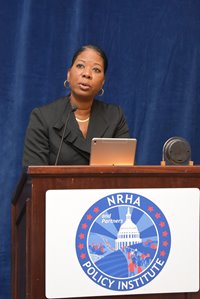Recognizing and repairing rural health disparities
Over the course of our conference, we heard from a diverse group of speakers including top members of the administration, members of Congress and their staff, and health care advocates. Each speaker focused on how we can continue to improve health care access and quality for millions of rural Americans. Attendees had the opportunity to speak directly with members of Congress about the issues most relevant to their communities and network with other rural health professionals about systems and strategies that can help improve health outcomes.
A personal highlight for me was participating in the Rural Health Disparities Summit. Rural Americans have long faced significant health challenges — we’re nearly 40 percent more likely to suffer from coronary heart disease, 8.6 percent more likely to suffer from diabetes, and 5.5 percent more likely to suffer from obesity compared to those living in urban centers. This may be because rural communities are historically underrepresented in biomedical research. In many of the studies that inform important treatment programs, specific rural health needs aren’t taken into consideration.
In 2018, NRHA joined the National Institutes of Health’s All of Us Research Program as an official partner. As I shared in a post last month, All of Us is a national effort that seeks to gather the health data of one million or more individuals living in the United States to accelerate medical research and improve community health by focusing on precision medicine. Precision medicine considers not only a patient's health information but also their genetic makeup, socioeconomic status, where they live, and what they do for a living.
 Precision medicine and the All of Us Research Program were a central focus of our Rural Health Disparities Summit. We were lucky enough to have Dr. Dara Richardson-Heron join us. Richardson-Heron is the chief engagement officer and scientific executive for the All of Us Research Program. In her position, she builds and maintains strong relationships between the program, its many community and provider partners like NRHA, and the more than 100,000 participants who have already enrolled.
Precision medicine and the All of Us Research Program were a central focus of our Rural Health Disparities Summit. We were lucky enough to have Dr. Dara Richardson-Heron join us. Richardson-Heron is the chief engagement officer and scientific executive for the All of Us Research Program. In her position, she builds and maintains strong relationships between the program, its many community and provider partners like NRHA, and the more than 100,000 participants who have already enrolled.Richardson-Heron spoke to our attendees about the importance of furthering precision medicine and diversifying biomedical research and how All of Us will benefit rural communities across America for generations to come.
Richardson-Heron also focused on how the program is working toward “quadruple diversity,” or “diversity of people, geography, health status, and data types.” She noted one of the program’s goals is to have 75 percent of the one million participants be individuals who belong to communities that have been historically underrepresented in biomedical research.
This emphasis on including historically underrepresented groups like rural communities will give medical professionals access to important data that will allow them to develop individually tailored treatments and drive more positive health outcomes for all.
This year’s Policy Institute highlighted the excellent work being done on behalf of rural America’s health and well-being. I speak on behalf of everyone at NRHA when I say we are excited to continue our work for our members. Through further engagement with the All of Us Research Program, community health worker trainings, and conferences and innovation summits planned throughout the spring, NRHA is dedicated to creating a healthier future for you and your families.
Learn more about All of Us and sign up.
NRHA partnered with the National Institutes of Health to produce the above piece for publication within the Association’s Rural Health Voices blog
